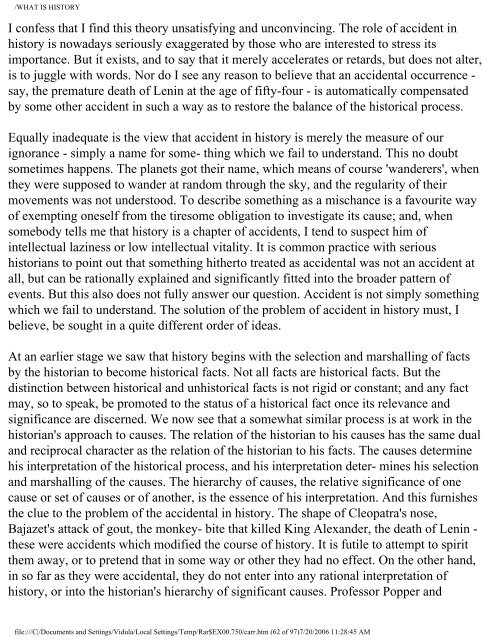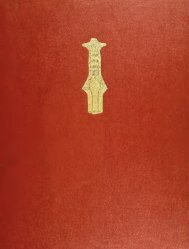What is History / by Edward Hallett Carr - Universal History Library
What is History / by Edward Hallett Carr - Universal History Library
What is History / by Edward Hallett Carr - Universal History Library
Create successful ePaper yourself
Turn your PDF publications into a flip-book with our unique Google optimized e-Paper software.
WHAT IS HISTORY<br />
I confess that I find th<strong>is</strong> theory unsat<strong>is</strong>fying and unconvincing. The role of accident in<br />
h<strong>is</strong>tory <strong>is</strong> nowadays seriously exaggerated <strong>by</strong> those who are interested to stress its<br />
importance. But it ex<strong>is</strong>ts, and to say that it merely accelerates or retards, but does not alter,<br />
<strong>is</strong> to juggle with words. Nor do I see any reason to believe that an accidental occurrence -<br />
say, the premature death of Lenin at the age of fifty-four - <strong>is</strong> automatically compensated<br />
<strong>by</strong> some other accident in such a way as to restore the balance of the h<strong>is</strong>torical process.<br />
Equally inadequate <strong>is</strong> the view that accident in h<strong>is</strong>tory <strong>is</strong> merely the measure of our<br />
ignorance - simply a name for some- thing which we fail to understand. Th<strong>is</strong> no doubt<br />
sometimes happens. The planets got their name, which means of course 'wanderers', when<br />
they were supposed to wander at random through the sky, and the regularity of their<br />
movements was not understood. To describe something as a m<strong>is</strong>chance <strong>is</strong> a favourite way<br />
of exempting oneself from the tiresome obligation to investigate its cause; and, when<br />
somebody tells me that h<strong>is</strong>tory <strong>is</strong> a chapter of accidents, I tend to suspect him of<br />
intellectual laziness or low intellectual vitality. It <strong>is</strong> common practice with serious<br />
h<strong>is</strong>torians to point out that something hitherto treated as accidental was not an accident at<br />
all, but can be rationally explained and significantly fitted into the broader pattern of<br />
events. But th<strong>is</strong> also does not fully answer our question. Accident <strong>is</strong> not simply something<br />
which we fail to understand. The solution of the problem of accident in h<strong>is</strong>tory must, I<br />
believe, be sought in a quite different order of ideas.<br />
At an earlier stage we saw that h<strong>is</strong>tory begins with the selection and marshalling of facts<br />
<strong>by</strong> the h<strong>is</strong>torian to become h<strong>is</strong>torical facts. Not all facts are h<strong>is</strong>torical facts. But the<br />
d<strong>is</strong>tinction between h<strong>is</strong>torical and unh<strong>is</strong>torical facts <strong>is</strong> not rigid or constant; and any fact<br />
may, so to speak, be promoted to the status of a h<strong>is</strong>torical fact once its relevance and<br />
significance are d<strong>is</strong>cerned. We now see that a somewhat similar process <strong>is</strong> at work in the<br />
h<strong>is</strong>torian's approach to causes. The relation of the h<strong>is</strong>torian to h<strong>is</strong> causes has the same dual<br />
and reciprocal character as the relation of the h<strong>is</strong>torian to h<strong>is</strong> facts. The causes determine<br />
h<strong>is</strong> interpretation of the h<strong>is</strong>torical process, and h<strong>is</strong> interpretation deter- mines h<strong>is</strong> selection<br />
and marshalling of the causes. The hierarchy of causes, the relative significance of one<br />
cause or set of causes or of another, <strong>is</strong> the essence of h<strong>is</strong> interpretation. And th<strong>is</strong> furn<strong>is</strong>hes<br />
the clue to the problem of the accidental in h<strong>is</strong>tory. The shape of Cleopatra's nose,<br />
Bajazet's attack of gout, the monkey- bite that killed King Alexander, the death of Lenin -<br />
these were accidents which modified the course of h<strong>is</strong>tory. It <strong>is</strong> futile to attempt to spirit<br />
them away, or to pretend that in some way or other they had no effect. On the other hand,<br />
in so far as they were accidental, they do not enter into any rational interpretation of<br />
h<strong>is</strong>tory, or into the h<strong>is</strong>torian's hierarchy of significant causes. Professor Popper and<br />
file:///C|/Documents and Settings/Vidula/Local Settings/Temp/Rar$EX00.750/carr.htm (62 of 97)7/20/2006 11:28:45 AM







